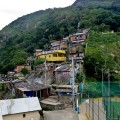Interview with Charles Meshack
Cécile S | November 18, 2013.
Charles Meshack heads up Tanzania’s Forest Conservation Group. Founded in 1995, it is now the largest Tanzanian NGO focussing on natural forest conservation.
In Warsaw, he recently presented about the successes of reducing deforestation in Tanzania. You could see both pride and despair in his eyes. He is proud yet also desperate about international negotiations on forestry issues.
The Verb sat down with him to bring out the real Tanzania’s story.
Mr. Meschak, how have you perceived the COP until now?
There seems to be a lot of negative sentiment, including a lot of delays and frustration, especially in the area of forestry, where countries are currently negotiating about the international market mechanism REDD+ (Reducing Emissions from Deforestation and Degradation).
Why is REDD+ so important?
The mechanism is very promising because it consists of finance being transferred from developed to developing countries for reductions of emissions from deforestation and degradation: a sector which makes up 20 per cent of the world’s emissions.
That seems quite straightforward, so what is the problem in the negotiations issue on REDD+?
The main issue currently being discussed on REDD+ is Monitoring, Reporting and Verification (MRV). The problem is like with the chicken and the egg: a question of who came first. Developed countries do not want to finance REDD+ in developing countries until they have a proper MRV system in place, which ensures effective results on the ground. But developing countries need the money first to establish their MRV system, since they do not have the necessary capacity and resources of a national monitoring system of deforestation for example.
And where does Tanzania stand in all this?
Tanzania is currently in the process of establishing its MRV system thanks to bilateral funding from Norway. But Norway cannot finance these early efforts for all countries with valuable forests, so Tanzania supports the position of developing countries, in favour of some initial funding that allows for the MRV system development.
Aside from this disagreement, what kind of concrete efforts have been made on the ground?
Thanks to the Norwegian support, we could start our first pilot project in Tanzania. Our goal was to achieve a pro-poor REDD+ project, that encourages conservation agriculture. Instead of deforesting for new pastures, farmers were encouraged to increase their yields on existing lands and to cultivate degraded areas. Other efforts include land-use planning to address the challenge of unclear land tenure rights.
And then communities were rewarded?
Yes. Voluntary carbon markets, consisting of companies who decide to offset their emissions, transferred money to the community-level. These funds were then distributed to the individual households.
It sounds like a win-win situation for everyone. Can we just stick to this bottom-up approach then?
The problem is that given the historic low of the carbon price on the markets, the payments are too low to incentivise behaviors. There is just not enough demand for carbon credits from companies, compared to all the projects generating carbon credits.
How can we overcome this challenge?
Communities did a lot to reduce deforestation. It is time for the international community to come to a strong agreement and show their willingness to pay for these efforts. It’s like with the frog in the water when you start to heat it: he will only realise it when it is too late. So I am calling on the developed countries’ to let us leave the slowly warming water before it is too late.
In closing, he joked that he would not join the official Tanzanian delegation because he isn’t a masochist.
By Cécile Schneider, top photo via Connected Voices.











comment